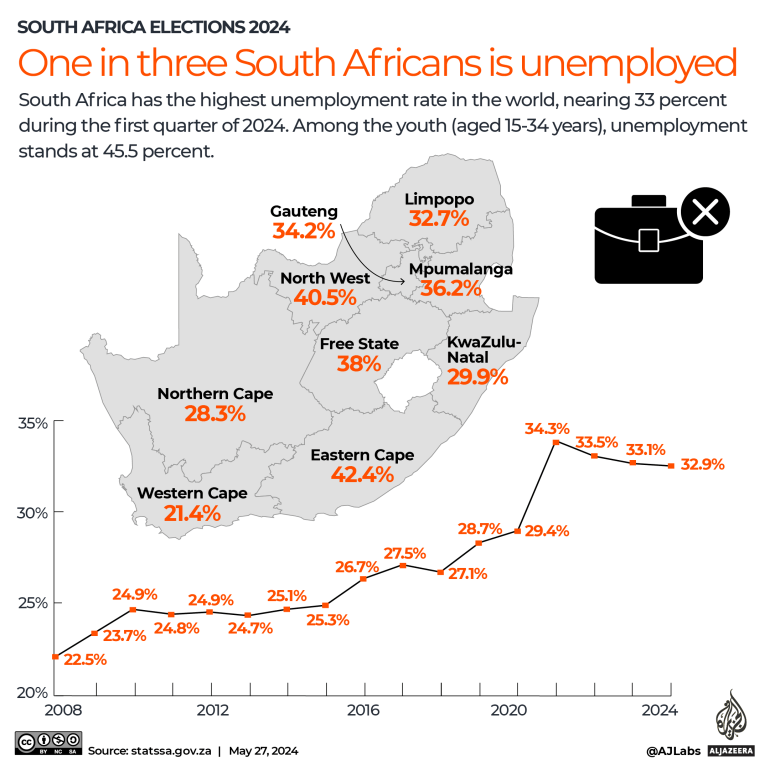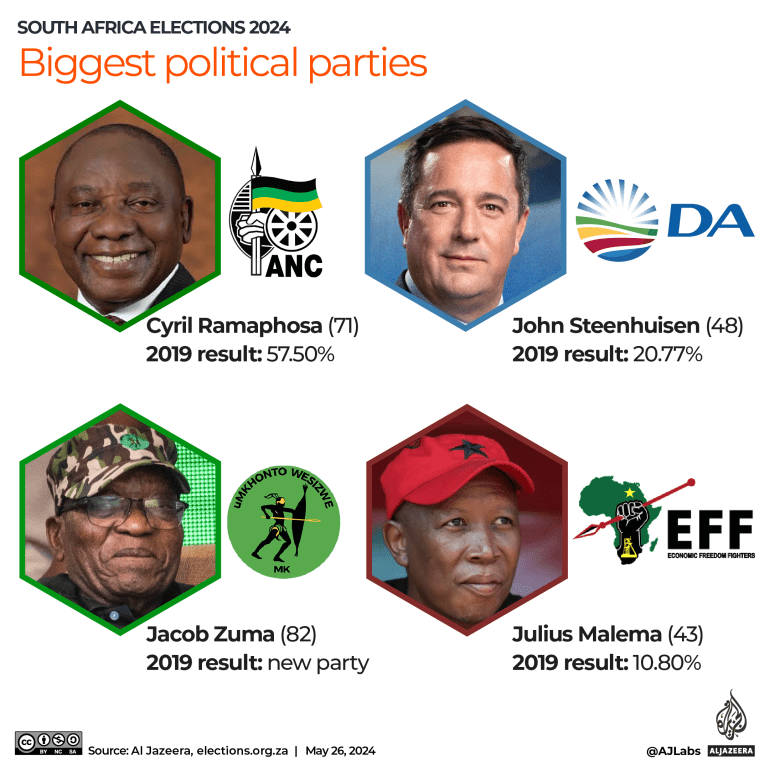In the narrative of Ramaphosa’s ruling African National Congress (ANC), Hlavanganwane is among the “Tintswalos” — the name given to young South Africans born after the introduction of democracy who benefitted from the ANC government.
That’s not how Hlavanganwane sees it, though.
He has an accounting degree from the University of Johannesburg. But far too often, he himself is a statistic. Like millions of other South Africans, he has no job despite trying for months to land one. In all, 45.5 percent of young people in South Africa are unemployed.
A week before South Africa’s elections on Wednesday, a quarterly survey that measures unemployment by Statistics South Africa revealed the total number of unemployed people in South Africa increased by 330,000 to 8.2 million during the first quarter. The overall unemployment rate is almost 33 percent, the highest in the world.

That harsh reality was the reason Hlavanganwane showed up to vote – and the reason he said he could not vote for the governing African National Congress (ANC) even though he comes from a family with strong ties to the party, which led the freedom movement against apartheid. The ANC has ruled South Africa since winning the country’s first post-apartheid democratic elections in 1994.
“I am nervous, but it is necessary for us to vote to effect change,” Hlavanganwane said. “It doesn’t seem like they care about the youth. The unemployment rate is going up.”
In its election campaign, the ANC promised to create 2.5 million jobs if given a chance to govern again for the next five years.
But Hlavanganwane said he wasn’t persuaded and it was time for a break with the past – for the country and for him.
“My grandmother was a person who really supported the ANC. She went to ANC events and meetings. I grew up knowing the ANC and that they are the right people to vote for,” he said. “As you grow older, you get exposed to stuff, and you learn more. They may actually not be the right people to vote for.”
Like other parts of the country, support for the ANC in Soweto – the township in Johannesburg that Nelson Mandela and Archbishop Desmond Tutu called home – is waning.
On Wednesday, voting stations opened at 7am with isolated incidents of delays and disruptions. They will stay open until 9pm, and counting starts soon after. Nearly 28 million South Africans are registered as voters in a country with a population of 62 million. Results are expected by Sunday.
Polls suggest that the vote could prove historic, marking the first time that the ANC may lose its majority since 1994. John Steenhuisen, the leader of the principal opposition party, the Democratic Alliance, said while voting in Durban: “This is a critical election for South Africa and tomorrow can be a better country, but only if we vote for it.”
In the province of KwaZulu-Natal, the upstart uMkhonto weSizwe (MK) party, led by former President Jacob Zuma, is favoured to win as it eats into ANC votes.
But outside his Soweto voting booth, Ramaphosa was bullish about the ANC’s national prospects. “The people of South Africa will give the ANC a firm majority as they vote today. There isn’t any doubt about it. The ANC, under my leadership, led a formidable campaign,” he said. “People are voting for stabilisation and extension of our democracy. It is a great day for the people of South Africa when South Africa decides who should lead the government.” ANC supporters in Soweto ululated as the president zoomed out of the township he once called home.

‘Excited to vote’
In the nearby town of Lenasia, Attiya Songo was voting for the first time. “I am very excited,” she said.
The 23-year-old political science student at the University of Johannesburg grew up in a house of ANC activists. Her family was among millions that were forced to relocate by the apartheid state, and she grew up hearing tales from her father and grandfather about the struggle for freedom.
As a child, Attiya had a rosy view of the ANC from the stories she heard from her parents and grandparents. Now with a chance to vote, she doesn’t share that view.
“When I was younger, there were some good things about them. Now as I get older, I don’t have any positive things to say about the ANC,” she said. “It was never a consideration to vote for them.”
Her mother, Salma Songo, who stood behind her in the queue to vote at Lenz Public School, said she had voted for the ANC since 1994.
She said it had been unthinkable that the day would come when she would not vote for the ANC anymore. Yet Wednesday was that day.
“I remember the excitement and exhilaration of voting in 1994. We voted here in Lenasia. We had the snaking, winding queues, and there was absolute excitement,” Salma said.
She said corruption and greed were the main reasons why the ANC had lost its way. And at least some of its vote.